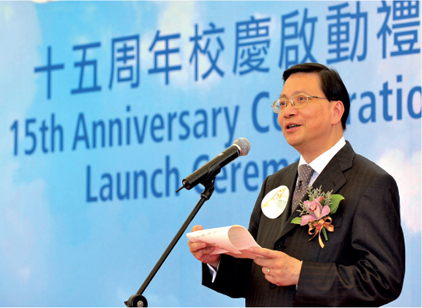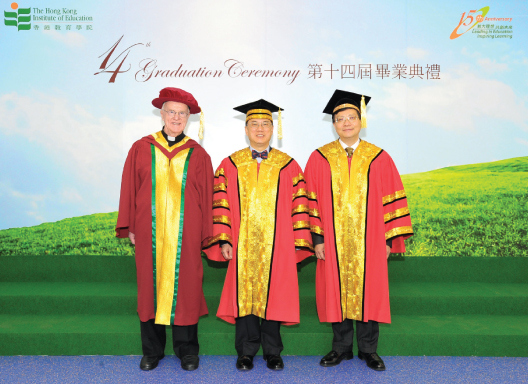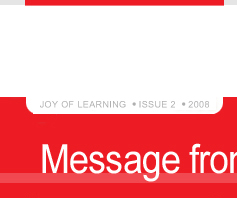I am very pleased to be in touch with you all once again, through this second Message of mine in the Joy of Learning.
|
 |
As Hong Kong’s stronghold of teacher education, we at The Hong Kong Institute of Education are determined that our graduates will be able to face up to the challenges of the information era in the |
|
21st century – an era when school children will be acquiring knowledge through diverse information channels and where teachers are no longer seen as the single source of knowledge and learning. To foster the necessary attributes among our teachers of tomorrow and promote the Institute’s vision, our “Education Plus” concept places a strong emphasis on providing a total-learning experience, through both formal and non-formal education practices.
|
|
| Under “Education Plus”, the formal education spectrum offers diverse subject specialisations and a multi-disciplinary approach, to ensure a broad knowledge base. Of equal importance, the non-formal education aspects (such as learning through social service) form an integral part of the curriculum. Through these co-curricular activities, conducted locally, on the Mainland and around the world, our students broaden their horizons and acquire alternative sources of knowledge. Just in the past summer, a number of our students participated actively in various community initiatives and exchange programmes. In addition to volunteering in the Equestrian Olympics in Hong Kong, others joined internships and trainee programmes around the world, visiting Australia, the Thai-Burmese border, Italy, Japan, the US, Vietnam and the Mainland.
|
 |
| In Hong Kong, the heritage of teacher education dates as far back as 1881, when the first Government Normal School was established by the then Governor, John Pope Hennessy. Our own roots can be traced to 1939, when Northcote Training College was founded to provide full-time teacher training for aspiring young teachers of the time. The Institute itself was established in 1994, with the amalgamation of Hong Kong’s five former Colleges of Education.
As such, we will be celebrating the Institute’s 15th Anniversary next year. Commemorating this memorable milestone while also paying tribute to the history of teacher education in Hong Kong, we have launched an “Education Year” – with a planned programme of year-long activities that will not only promote, but we also hope, provoke thought and discussion in education. Activities planned not only include a series of public lectures on education, international academic conferences, an inaugural Asian Roundtable of Presidents of Universities of Education, and a Parent-Teacher Summit 2008, but also an Education Heritage Project, alumni homecoming events, radio-television programmes, as well as community involvement projects. I very much hope that with these celebrations and outreach activities, the entire community will be able to re-visit with the Institute the core values of education, which can have a powerful impact on the development of Hong Kong, and the city’s role as the education hub of the Asia-Pacific Region.
 |
(From right to left) Professor Anthony Cheung, HKIEd President; The Honourable Donald Tsang, GBM, HKSAR Chief Executive and Chancellor of the Institute; and Father Alfred Deignan, Honorary Doctorate recipient at the HKIEd’s 14th Graduation Ceremony. |
|
 |
| These successes are only possible if we take steps to put our footprints on the international stage, in concert with our peers around the world. As such, grounded in the objectives of our Development Blueprint, we have identified internationalisation and Mainland outreach as one of our strategic priorities for development. Also recognising that universities of education can be widely found in both Asia and Europe, we have sought active connection with our counterparts in these institutions. In late October and early November, I thus led an HKIEd delegation to Japan and Korea, visiting five universities of education there. These visits not only built on previous visits we made to the UK and US earlier this year, they also helped to consolidate and expand academic collaboration and arrangements for student exchanges.
Both Japan and Korea have a long history and strong tradition in teacher education through specialist universities. We were therefore able to take a first-hand look at their experiences, transformation and growth into universities of education. The two countries also place an equal emphasis on the development of education disciplines as well as the liberal arts and sciences including health education, in their universities of education. This dual development has convinced us that the Institute’s “Education Plus” vision is on the right track. As an added benefit, the visits helped to prepare the ground work for the hosting of HKIEd’s inaugural Asian Roundtable of Presidents of Universities of Education, to be held in Hong Kong in May 2009.
|
 |
| In line with our Development Blueprint and expanding our academic and research capacities, we created the new position of Vice President (Research and Development) in addition to recruiting a number of professors and chair professors both from Hong Kong and around the world. All our new recruits are acknowledged leaders in their respective fields of study, with strong track records in research and practice.
With this enlarged and critical mass of academics, their diverse expertise and varied cultural backgrounds, I am confident that we will see a more vibrant cross-fertilisation of ideas and education experiences. This will promise a thriving and robust academic environment at the Institute, in line with leading universities of education across the world. |

Anthony B. L. Cheung
President |
| |
| |
|
|
|
 |


